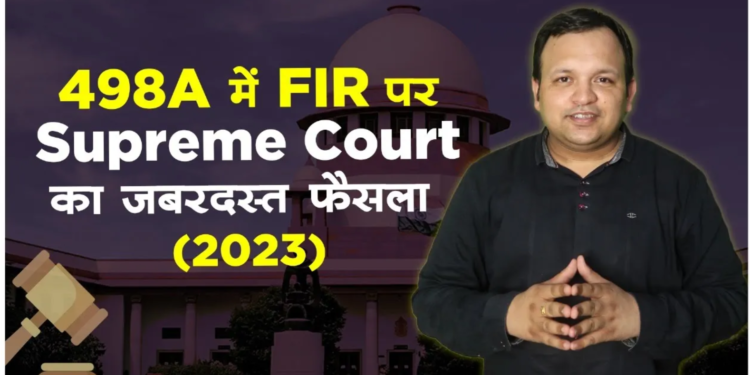INTRODUCTION
In 1983, an amendment was made to the Indian Penal Code, 1860 (IPC), adding Section 498A. It was passed to shield married women from abuse by their husbands or in-laws, which frequently results in dowry deaths. The goal of this is to penalize a husband and his family members who mistreat and abuse their wives to force them or anybody connected to them to comply with illegal demands, etc. Therefore, this criminal law effectively prevents marital disputes while simultaneously upholding the dignity of married women and punishing criminals.
In a landmark judgment, named, Priya Indoria V/S The State Of Karnataka & Ors, the Supreme Court clarified the issue of where can an FIR be registered in cases of Sec 498a.
If there still lies any doubt, feel free to contact us at, https://thelegalshots.com/legal-opinion/
BRIEF FACTS OF THE CASE
The wife, who is the complainant/ appellant got married to the husband, who is the accused on December 11, 2020, and they started living in Bengaluru. The husband filed a divorce petition in November 2021 under section 13 of the Hindu Marriage Act, 1955 before the Family Court, Bengaluru. But further to this, the appellant filed a transfer of divorce petition from Bengaluru to the Court of Additional District Judge in Chirawa, Jhunjhunu, Rajasthan. Simultaneously, the wife filed a complaint that she was a victim of harassment, torture and physical assault for the dowry demand against the accused- husband and his family members. An FIR was filed by an appellant-wife at the Chirawa police station, Rajasthan on January 25, 2022. Which led to an investigation under sections 498A, 323, and 406 of IPC.
The Appeal has been filed by the complainant-wife for the reversal of the grant of anticipatory bail order dated July 7, 2022, by the Additional City Civil and Session Judge in Bengaluru to the accused husband and his family. The complaint was filed in Chiwara police station, Rajasthan and the accused- husband and his family were charged under sections 498A, 323, and 406 of IPC but the anticipatory bail was granted to them by the Bengaluru Court. The husband contended, that even though the alleged offense happened in Bengaluru and the appellant was acquainted with the location because she had previously worked there, the accused husband and his family were harassed by the Chirawa Police Station after they filed a formal complaint.
THE JUDGEMENT
Applying the ruling in Rupali Devi v. State of UP, the Supreme Court ruled that the challenged judgment from Bengaluru’s Additional City Civil and Session Judge must be overturned since it failed to include respondent no. 2 in the criminal miscellaneous application. For the sake of justice, the court ordered that no coercive measures be taken against the accused for a period of four weeks. During this time, the accused may request anticipatory bail from the Rajasthan High Court or the competent court in Chirawa. Its purpose was to maintain justice by providing a temporary shield. Furthermore, the court mandated that any plea filed under section 438 of the Cr. P. C. before the Rajasthan High Court or the Session Court of Chirawa be handled promptly and based on the merits of each case individually. It was decided that although courts have the authority to award transit anticipatory bail for an FIR filed outside of their purview, they must do so carefully and only in very rare situations.
CONCLUSION
The case of Priya Indoria v. The State of Karnataka & Ors, 2023 sets a significant legal precedent regarding anticipatory bail and Cr. P. C. section 438. The Honourable Supreme Court introduced the notion of Transit Anticipatory Bail in recognition of the importance of protecting an individual’s liberty. Because doing so would violate the right to access justice, the court cannot grant this bail on the grounds of a conflict of jurisdiction. By allowing the person to obtain transitory anticipatory bail from the local High Court or Court of Session where they currently reside and protecting while traveling to the state where the FIR has been registered to obtain full-fledged anticipatory bail from the Court of Session or the High Court, this judgment safeguards the interests of justice.
To understand such complex law in simple ways, stay connected with www.thelegalshots.com
If doubts persist, contact our Legal Experts at https://thelegalshots.com/legal-opinion/




